[English] 日本語
 Yorodumi
Yorodumi- EMDB-24267: Structures of human ghrelin receptor-Gi complexes with ghrelin an... -
+ Open data
Open data
- Basic information
Basic information
| Entry | Database: EMDB / ID: EMD-24267 | |||||||||
|---|---|---|---|---|---|---|---|---|---|---|
| Title | Structures of human ghrelin receptor-Gi complexes with ghrelin and a synthetic agonist | |||||||||
 Map data Map data | cryoEM map of GHSR-Gi-ghrelin | |||||||||
 Sample Sample |
| |||||||||
| Function / homology |  Function and homology information Function and homology informationpositive regulation of bone development / positive regulation of gastric mucosal blood circulation / ghrelin receptor binding / negative regulation of locomotion / cortisol secretion / growth hormone secretagogue receptor activity / regulation of hindgut contraction / growth hormone-releasing hormone activity / negative regulation of circadian sleep/wake cycle, REM sleep / regulation of growth hormone secretion ...positive regulation of bone development / positive regulation of gastric mucosal blood circulation / ghrelin receptor binding / negative regulation of locomotion / cortisol secretion / growth hormone secretagogue receptor activity / regulation of hindgut contraction / growth hormone-releasing hormone activity / negative regulation of circadian sleep/wake cycle, REM sleep / regulation of growth hormone secretion / positive regulation of small intestinal transit / regulation of response to food / negative regulation of locomotion involved in locomotory behavior / growth hormone-releasing hormone receptor activity / regulation of gastric motility / response to follicle-stimulating hormone / regulation of transmission of nerve impulse / positive regulation of circadian sleep/wake cycle, non-REM sleep / positive regulation of cortisol secretion / positive regulation of corticotropin secretion / positive regulation of growth rate / ghrelin secretion / positive regulation of appetite / gastric acid secretion / growth hormone secretion / negative regulation of norepinephrine secretion / positive regulation of small intestine smooth muscle contraction / negative regulation of macrophage apoptotic process / neuronal dense core vesicle lumen / positive regulation of eating behavior / adult feeding behavior / positive regulation of growth hormone secretion / positive regulation of growth hormone receptor signaling pathway / negative regulation of appetite / actin polymerization or depolymerization / positive regulation of multicellular organism growth / cellular response to thyroid hormone stimulus / cartilage development / response to growth hormone / regulation of postsynapse organization / positive regulation of insulin-like growth factor receptor signaling pathway / positive regulation of vascular endothelial cell proliferation / response to L-glutamate / positive regulation of synapse assembly / negative regulation of interleukin-1 beta production / response to food / positive regulation of fatty acid metabolic process / response to dexamethasone / cellular response to insulin-like growth factor stimulus / regulation of synapse assembly / positive regulation of sprouting angiogenesis / negative regulation of endothelial cell proliferation / regulation of neurotransmitter receptor localization to postsynaptic specialization membrane / dendrite development / decidualization / peptide hormone binding / negative regulation of interleukin-6 production / protein tyrosine kinase activator activity / response to electrical stimulus / negative regulation of tumor necrosis factor production / Synthesis, secretion, and deacylation of Ghrelin / positive regulation of insulin secretion involved in cellular response to glucose stimulus / postsynaptic modulation of chemical synaptic transmission / adenylate cyclase inhibitor activity / synapse assembly / positive regulation of protein localization to cell cortex / response to hormone / T cell migration / hormone-mediated signaling pathway / Adenylate cyclase inhibitory pathway / positive regulation of adipose tissue development / D2 dopamine receptor binding / response to prostaglandin E / adenylate cyclase regulator activity / G protein-coupled serotonin receptor binding / adenylate cyclase-inhibiting serotonin receptor signaling pathway / insulin-like growth factor receptor signaling pathway / cellular response to forskolin / synaptic membrane / negative regulation of angiogenesis / Peptide ligand-binding receptors / regulation of mitotic spindle organization / excitatory postsynaptic potential / Regulation of insulin secretion / positive regulation of cholesterol biosynthetic process / negative regulation of insulin secretion / G protein-coupled receptor binding / positive regulation of insulin secretion / response to peptide hormone / G protein-coupled receptor activity / adenylate cyclase-inhibiting G protein-coupled receptor signaling pathway / negative regulation of inflammatory response / response to estrogen / Schaffer collateral - CA1 synapse / adenylate cyclase-modulating G protein-coupled receptor signaling pathway / centriolar satellite / G-protein beta/gamma-subunit complex binding / cellular response to insulin stimulus / glucose metabolic process / Olfactory Signaling Pathway Similarity search - Function | |||||||||
| Biological species |  Homo sapiens (human) / Homo sapiens (human) /  | |||||||||
| Method | single particle reconstruction / cryo EM / Resolution: 2.7 Å | |||||||||
 Authors Authors | Liu H / Sun D / Sun J / Zhang C | |||||||||
| Funding support |  United States, 2 items United States, 2 items
| |||||||||
 Citation Citation |  Journal: Nat Commun / Year: 2021 Journal: Nat Commun / Year: 2021Title: Structural basis of human ghrelin receptor signaling by ghrelin and the synthetic agonist ibutamoren. Authors: Heng Liu / Dapeng Sun / Alexander Myasnikov / Marjorie Damian / Jean-Louis Baneres / Ji Sun / Cheng Zhang /   Abstract: The hunger hormone ghrelin activates the ghrelin receptor GHSR to stimulate food intake and growth hormone secretion and regulate reward signaling. Acylation of ghrelin at Ser3 is required for its ...The hunger hormone ghrelin activates the ghrelin receptor GHSR to stimulate food intake and growth hormone secretion and regulate reward signaling. Acylation of ghrelin at Ser3 is required for its agonistic action on GHSR. Synthetic agonists of GHSR are under clinical evaluation for disorders related to appetite and growth hormone dysregulation. Here, we report high-resolution cryo-EM structures of the GHSR-G signaling complex with ghrelin and the non-peptide agonist ibutamoren as an investigational new drug. Our structures together with mutagenesis data reveal the molecular basis for the binding of ghrelin and ibutamoren. Structural comparison suggests a salt bridge and an aromatic cluster near the agonist-binding pocket as important structural motifs in receptor activation. Notable structural variations of the G and GHSR coupling are observed in our cryo-EM analysis. Our results provide a framework for understanding GHSR signaling and developing new GHSR agonist drugs. | |||||||||
| History |
|
- Structure visualization
Structure visualization
| Movie |
 Movie viewer Movie viewer |
|---|---|
| Structure viewer | EM map:  SurfView SurfView Molmil Molmil Jmol/JSmol Jmol/JSmol |
| Supplemental images |
- Downloads & links
Downloads & links
-EMDB archive
| Map data |  emd_24267.map.gz emd_24267.map.gz | 206.9 MB |  EMDB map data format EMDB map data format | |
|---|---|---|---|---|
| Header (meta data) |  emd-24267-v30.xml emd-24267-v30.xml emd-24267.xml emd-24267.xml | 15.7 KB 15.7 KB | Display Display |  EMDB header EMDB header |
| Images |  emd_24267.png emd_24267.png | 47.9 KB | ||
| Archive directory |  http://ftp.pdbj.org/pub/emdb/structures/EMD-24267 http://ftp.pdbj.org/pub/emdb/structures/EMD-24267 ftp://ftp.pdbj.org/pub/emdb/structures/EMD-24267 ftp://ftp.pdbj.org/pub/emdb/structures/EMD-24267 | HTTPS FTP |
-Validation report
| Summary document |  emd_24267_validation.pdf.gz emd_24267_validation.pdf.gz | 296.2 KB | Display |  EMDB validaton report EMDB validaton report |
|---|---|---|---|---|
| Full document |  emd_24267_full_validation.pdf.gz emd_24267_full_validation.pdf.gz | 295.7 KB | Display | |
| Data in XML |  emd_24267_validation.xml.gz emd_24267_validation.xml.gz | 6.7 KB | Display | |
| Data in CIF |  emd_24267_validation.cif.gz emd_24267_validation.cif.gz | 7.8 KB | Display | |
| Arichive directory |  https://ftp.pdbj.org/pub/emdb/validation_reports/EMD-24267 https://ftp.pdbj.org/pub/emdb/validation_reports/EMD-24267 ftp://ftp.pdbj.org/pub/emdb/validation_reports/EMD-24267 ftp://ftp.pdbj.org/pub/emdb/validation_reports/EMD-24267 | HTTPS FTP |
-Related structure data
| Related structure data |  7na7MC  7na8C M: atomic model generated by this map C: citing same article ( |
|---|---|
| Similar structure data |
- Links
Links
| EMDB pages |  EMDB (EBI/PDBe) / EMDB (EBI/PDBe) /  EMDataResource EMDataResource |
|---|---|
| Related items in Molecule of the Month |
- Map
Map
| File |  Download / File: emd_24267.map.gz / Format: CCP4 / Size: 244.1 MB / Type: IMAGE STORED AS FLOATING POINT NUMBER (4 BYTES) Download / File: emd_24267.map.gz / Format: CCP4 / Size: 244.1 MB / Type: IMAGE STORED AS FLOATING POINT NUMBER (4 BYTES) | ||||||||||||||||||||||||||||||||||||||||||||||||||||||||||||
|---|---|---|---|---|---|---|---|---|---|---|---|---|---|---|---|---|---|---|---|---|---|---|---|---|---|---|---|---|---|---|---|---|---|---|---|---|---|---|---|---|---|---|---|---|---|---|---|---|---|---|---|---|---|---|---|---|---|---|---|---|---|
| Annotation | cryoEM map of GHSR-Gi-ghrelin | ||||||||||||||||||||||||||||||||||||||||||||||||||||||||||||
| Projections & slices | Image control
Images are generated by Spider. | ||||||||||||||||||||||||||||||||||||||||||||||||||||||||||||
| Voxel size | X=Y=Z: 0.65 Å | ||||||||||||||||||||||||||||||||||||||||||||||||||||||||||||
| Density |
| ||||||||||||||||||||||||||||||||||||||||||||||||||||||||||||
| Symmetry | Space group: 1 | ||||||||||||||||||||||||||||||||||||||||||||||||||||||||||||
| Details | EMDB XML:
CCP4 map header:
| ||||||||||||||||||||||||||||||||||||||||||||||||||||||||||||
-Supplemental data
- Sample components
Sample components
-Entire : Complex of GHSR-Gi-ghrelin
| Entire | Name: Complex of GHSR-Gi-ghrelin |
|---|---|
| Components |
|
-Supramolecule #1: Complex of GHSR-Gi-ghrelin
| Supramolecule | Name: Complex of GHSR-Gi-ghrelin / type: complex / ID: 1 / Parent: 0 / Macromolecule list: #1-#6 |
|---|---|
| Source (natural) | Organism:  Homo sapiens (human) Homo sapiens (human) |
| Recombinant expression | Organism: Insect expression vector pBlueBacmsGCA1His (others) |
-Macromolecule #1: Guanine nucleotide-binding protein G(i) subunit alpha-1
| Macromolecule | Name: Guanine nucleotide-binding protein G(i) subunit alpha-1 type: protein_or_peptide / ID: 1 / Number of copies: 1 / Enantiomer: LEVO |
|---|---|
| Source (natural) | Organism:  Homo sapiens (human) Homo sapiens (human) |
| Molecular weight | Theoretical: 40.429059 KDa |
| Recombinant expression | Organism: Insect expression vector pBlueBacmsGCA1His (others) |
| Sequence | String: MGCTLSAEDK AAVERSKMID RNLREDGEKA AREVKLLLLG AGESGKSTIV KQMKIIHEAG YSEEECKQYK AVVYSNTIQS IIAIIRAMG RLKIDFGDSA RADDARQLFV LAGAAEEGFM TAELAGVIKR LWKDSGVQAC FNRSREYQLN DSAAYYLNDL D RIAQPNYI ...String: MGCTLSAEDK AAVERSKMID RNLREDGEKA AREVKLLLLG AGESGKSTIV KQMKIIHEAG YSEEECKQYK AVVYSNTIQS IIAIIRAMG RLKIDFGDSA RADDARQLFV LAGAAEEGFM TAELAGVIKR LWKDSGVQAC FNRSREYQLN DSAAYYLNDL D RIAQPNYI PTQQDVLRTR VKTTGIVETH FTFKDLHFKM FDVGGQRSER KKWIHCFEGV TAIIFCVALS DYDLVLAEDE EM NRMHESM KLFDSICNNK WFTDTSIILF LNKKDLFEEK IKKSPLTICY PEYAGSNTYE EAAAYIQCQF EDLNKRKDTK EIY THFTCA TETKNVQFVF DAVTDVIIKN NLKDCGLF |
-Macromolecule #2: Guanine nucleotide-binding protein G(I)/G(S)/G(T) subunit beta-1
| Macromolecule | Name: Guanine nucleotide-binding protein G(I)/G(S)/G(T) subunit beta-1 type: protein_or_peptide / ID: 2 / Number of copies: 1 / Enantiomer: LEVO |
|---|---|
| Source (natural) | Organism:  Homo sapiens (human) Homo sapiens (human) |
| Molecular weight | Theoretical: 37.417918 KDa |
| Recombinant expression | Organism: Insect expression vector pBlueBacmsGCA1His (others) |
| Sequence | String: MSELDELRQE AEQLKNQIRD ARKACADATL SQITNNIDPV GRIQMRTRRT LRGHLAKIYA MHWGTDSRLL VSASQDGKLI IWDSYTTNK VHAIPLRSSW VMTCAYAPSG NYVACGGLDN ICSIYNLKTR QGNVRVSREL AGHTGYLSCC RFLDDNQIVT S SGDTTCAL ...String: MSELDELRQE AEQLKNQIRD ARKACADATL SQITNNIDPV GRIQMRTRRT LRGHLAKIYA MHWGTDSRLL VSASQDGKLI IWDSYTTNK VHAIPLRSSW VMTCAYAPSG NYVACGGLDN ICSIYNLKTR QGNVRVSREL AGHTGYLSCC RFLDDNQIVT S SGDTTCAL WDIETGQQTT TFTGHTGDVM SLSLAPDTRL FVSGACDASA KLWDVREGMC RQTFTGHESD INAICFFPDG NA FATGSDD ATCRLFDLRA DQELMTYSHD NIICGITSVS FSKSGRLLLA GYDDFNCNVW DALKADRAGV LAGHDNRVSC LGV TDDGMA VATGSWDSFL KIWN |
-Macromolecule #3: Guanine nucleotide-binding protein G(I)/G(S)/G(O) subunit gamma-2
| Macromolecule | Name: Guanine nucleotide-binding protein G(I)/G(S)/G(O) subunit gamma-2 type: protein_or_peptide / ID: 3 / Number of copies: 1 / Enantiomer: LEVO |
|---|---|
| Source (natural) | Organism:  Homo sapiens (human) Homo sapiens (human) |
| Molecular weight | Theoretical: 7.859173 KDa |
| Recombinant expression | Organism: Insect expression vector pBlueBacmsGCA1His (others) |
| Sequence | String: MASNNTASIA QARKLVQQLK MEANIDRIKV SKAAADLMAY CEAHAKEDPL LTPVPASQNP FREKKFFCAI L |
-Macromolecule #4: Antibody fragment
| Macromolecule | Name: Antibody fragment / type: protein_or_peptide / ID: 4 / Number of copies: 1 / Enantiomer: LEVO |
|---|---|
| Source (natural) | Organism:  |
| Molecular weight | Theoretical: 26.236244 KDa |
| Recombinant expression | Organism: Insect expression vector pBlueBacmsGCA1His (others) |
| Sequence | String: VQLVESGGGL VQPGGSRKLS CSASGFAFSS FGMHWVRQAP EKGLEWVAYI SSGSGTIYYA DTVKGRFTIS RDDPKNTLFL QMTSLRSED TAMYYCVRSI YYYGSSPFDF WGQGTTLTVS SGGGGSGGGG SGGGGSDIVM TQATSSVPVT PGESVSISCR S SKSLLHSN ...String: VQLVESGGGL VQPGGSRKLS CSASGFAFSS FGMHWVRQAP EKGLEWVAYI SSGSGTIYYA DTVKGRFTIS RDDPKNTLFL QMTSLRSED TAMYYCVRSI YYYGSSPFDF WGQGTTLTVS SGGGGSGGGG SGGGGSDIVM TQATSSVPVT PGESVSISCR S SKSLLHSN GNTYLYWFLQ RPGQSPQLLI YRMSNLASGV PERFSGSGSG TAFTLTISRL EAEDVGVYYC MQHLEYPLTF GA GTKLEL |
-Macromolecule #5: Growth hormone secretagogue receptor type 1
| Macromolecule | Name: Growth hormone secretagogue receptor type 1 / type: protein_or_peptide / ID: 5 / Number of copies: 1 / Enantiomer: LEVO |
|---|---|
| Source (natural) | Organism:  Homo sapiens (human) Homo sapiens (human) |
| Molecular weight | Theoretical: 41.40641 KDa |
| Recombinant expression | Organism: Insect expression vector pBlueBacmsGCA1His (others) |
| Sequence | String: MWNATPSEEP GFNLTLADLD WDASPGNDSL GDELLQLFPA PLLAGVTATC VALFVVGIAG NLLTMLVVSR FRELRTTTNL YLSSMAFSD LLIFLCMPLD LVRLWQYRPW NFGDLLCKLF QFVSESCTYA KVLTITALSV ERYFAICFPL RAKVVVTKGR V KLVIFVIW ...String: MWNATPSEEP GFNLTLADLD WDASPGNDSL GDELLQLFPA PLLAGVTATC VALFVVGIAG NLLTMLVVSR FRELRTTTNL YLSSMAFSD LLIFLCMPLD LVRLWQYRPW NFGDLLCKLF QFVSESCTYA KVLTITALSV ERYFAICFPL RAKVVVTKGR V KLVIFVIW AVAFCSAGPI FVLVGVEHEQ GTDPWDTNEC RPTEFAVRSG LLTVMVWVSS IFFFLPVFCL TVLYSLIGRK LW RRRRGDA VVGASLRDQN HKQTVKMLAV VVFAFILCWL PFHVGRYLFS KSFEPGSLEI AQISQYCNLV SFVLFYLSAA INP ILYNIM SKKYRVAVFR LLGFEPFSQR KLSTLKDESS RAWTESSINT |
-Macromolecule #6: Ghrelin-27
| Macromolecule | Name: Ghrelin-27 / type: protein_or_peptide / ID: 6 / Number of copies: 1 / Enantiomer: LEVO |
|---|---|
| Source (natural) | Organism:  Homo sapiens (human) Homo sapiens (human) |
| Molecular weight | Theoretical: 1.471657 KDa |
| Sequence | String: GS(1IC)FLSPEHQ RV |
-Macromolecule #7: CHOLESTEROL
| Macromolecule | Name: CHOLESTEROL / type: ligand / ID: 7 / Number of copies: 2 / Formula: CLR |
|---|---|
| Molecular weight | Theoretical: 386.654 Da |
| Chemical component information | 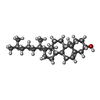 ChemComp-CLR: |
-Experimental details
-Structure determination
| Method | cryo EM |
|---|---|
 Processing Processing | single particle reconstruction |
| Aggregation state | particle |
- Sample preparation
Sample preparation
| Buffer | pH: 7.5 |
|---|---|
| Vitrification | Cryogen name: ETHANE |
- Electron microscopy
Electron microscopy
| Microscope | FEI TITAN KRIOS |
|---|---|
| Image recording | Film or detector model: GATAN K3 (6k x 4k) / Average electron dose: 82.0 e/Å2 |
| Electron beam | Acceleration voltage: 300 kV / Electron source:  FIELD EMISSION GUN FIELD EMISSION GUN |
| Electron optics | Illumination mode: FLOOD BEAM / Imaging mode: BRIGHT FIELD |
| Experimental equipment |  Model: Titan Krios / Image courtesy: FEI Company |
- Image processing
Image processing
| Final reconstruction | Resolution.type: BY AUTHOR / Resolution: 2.7 Å / Resolution method: FSC 0.143 CUT-OFF / Number images used: 280046 |
|---|---|
| Initial angle assignment | Type: MAXIMUM LIKELIHOOD |
| Final angle assignment | Type: MAXIMUM LIKELIHOOD |
 Movie
Movie Controller
Controller


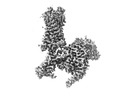

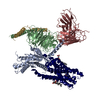

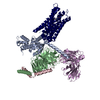
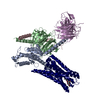


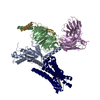




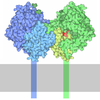

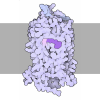
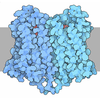



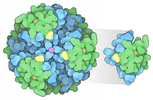
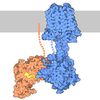

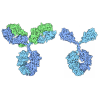



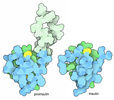



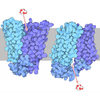


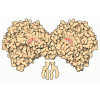

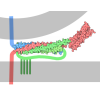
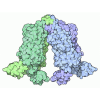
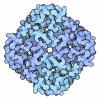
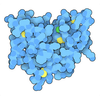




 Z (Sec.)
Z (Sec.) Y (Row.)
Y (Row.) X (Col.)
X (Col.)





















